Breaking apart carbon dioxide, or extracting carbon dioxide from the air, takes work. Work means energy. It's the reverse of combustion. There's a triple problem here: the technology itself, the disposal, and the energy to do the work.
It's a common saying that you can't unscramble an egg. You break an egg into a bowl, break the yolk membrane with your fork, mix the yolk thoroughly with the white, and stir it around in a hot skillet. The cooking uncurls the egg proteins, breaking some chemical bonds and causing new ones to form.
 |
It's a familiar impasse. Can we change the way we see the problem?
Feed our scrambled egg to a hen, and tomorrow she'll lay us a new egg. Her metabolism—a product of evolution rather than technology—will break down the complex scrambled egg molecules into simpler ones and reconstitute them, with losses of course, into a new, raw egg.
For many people, this solution will be less than ideal on a number of counts. Somehow, it's cheating, or it's just a temporary stopgap until we can do it right, with technology. Trying to patent the process may cause trouble, and the venture capitalists won't be interested. The hen won't win the Nobel. But I want you to notice that we do get success.
The challenging ecological problems we face—climate change, land degradation, the growing scarcity of food and water, and biodiversity loss—are like this. We are going to have to learn how to unscramble eggs, using the metabolisms of soil microbes fed by perennial grasses, for example. Our preference for merely technical solutions that often perpetuate or exacerbate the problems is a moral and ethical issue. This preference determines who has money, and who has power. We're infatuated with a stainless-steel prince, but if we want success we're going to have to kiss some real live slimy frogs.
In order to kiss them, we'll have to be able to recognize them. The examples that some of us have collected (managingwholes.com for example) have only been of interest to a small minority, those who have a basic grasp of how the carbon cycle, the water cycle, solar energy flow, and succession function at the soil surface. If you don't have this grasp, start now.
By enhancing these biospheric processes on a large scale—and there are proven, practical examples on individual parcels—we could unscramble the big eggs. The biggest challenge is the widespread belief that it's impossible, or that it's only possible with the right technology.
Recent Posts
Archive
Categories
- Events (2)
- policy and framing (23)
- ruminations (3)
Tags
- atlas (2)
Authors
- Peter Donovan (137)
- Didi Pershouse (3)